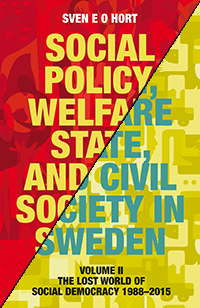Social Policy, Welfare State, and Civil Society in Sweden
Volume I & Volume II (bundle)
Paketpris med 30 % rabatt om du vill köpa båda volymerna tillsammans (annars kostar volym I 265 kr och volym II 236 kr). Läs mer om volym I. Läs mer om volym II.
Social Policy, Welfare State, and Civil Society in Sweden I–II gives a comprehensive account of the global invention of the welfare state, from the far north of the West to the global East and Southeast, and from its social policy origins to the most recent challenges from civil society.
It is an updated and enlarged edition in two volumes of Sven Hort’s well-known and wide-ranging dissertation Social Policy and Welfare State in Sweden, published under the author’s birth name Sven E. Olsson in 1990.
The first volume, History, Policies, and Institutions 1884–1988, contains the original four essays from 1990 and covers the formation and evolution of the Swedish welfare state. By now minor classics in welfare state literature, the essays have both inspired and started lively polemics among researchers of the field.
The second volume, The Lost World of Social Democracy 1988–2015, aims at the civil society challenge to the welfare state since 1988. It opens with an overview of the three generations of comparative welfare state research, from Harold Wilensky to Gøsta Esping-Andersen, Theda Skocpol and onwards. The civilizing process and embeddedness of the welfare-industrial complex are then scrutinized as the simultaneous deconstruction and reconstruction of the once famous Swedish welfare state is elaborated with force and vigour. Finally, the cross-national Scandinavian differences are outlined. The five essays of volume II emphasize the historical relativity of social welfare institutions and argue against all developmental metaphysics.
Sven E. O. Hort is Professor in Social Welfare at the College of Social Sciences, Seoul National University, Korea. He is an alumnus of Lund University. In Sweden he taught sociology at Linneaus and Södertörn universities. Currently he is the chief editor of the Swedish journal Arkiv. Tidskrift för samhällsanalys and a deputy editor of European Societies. With Stein Kuhnle he is the author of “The Coming of East and South-East Asian Welfare States”, Journal of European Social Policy (2000).
In praise of the new edition:
“The publication of this book in 1990 marked a turning point in understanding of how the Swedish welfare state should be conceptualized both from a historical and comparative perspective. Its combination of sophisticated theoretical perspectives and in-depth empirical analysis became a model for many later studies of welfare state regimes. Added to the timely new edition is a ‘volume II’ sequel that updates and deepens the analysis of how the Swedish welfare state has fared during the era of globalization. This new edition is a ‘must read’ for everyone interested in the history and future of welfare state regimes.” – Bo Rothstein, August Röhss Chair in Political Science, University of Gothenburg
“This is an impressive, comprehensive and knowledgeable contribution to the analysis of the early history and long-term development of the Swedish welfare state. Through a prime focus on reform actors at various stages we are persuasively reminded that there was a history before the ascendance of Social Democracy from the early 1930s, that the Social Democrats played a crucial role in the expansionary phase, and that one must go beyond theories of class politics to get a proper understanding of the evolution and characteristics of the modern welfare state.” – Stein Kuhnle, Professor in Comparative Politics, Hertie School of Governance and University of Bergen
“The development of the Swedish welfare state is often sketched in fairly simplistic terms. Professor Hort’s analysis remains the most penetrating of the complex and fascinating interplay between politics, social forces, and economic development that explains much of the intricacies of the system that eventually emerged.” – Gunnar Wetterberg, The Royal Swedish Academy of Sciences
“Social Policy, Welfare State and Civil Society in Sweden provides an enormity of information and a cogent analysis of the changes that have taken place there over the past 25 years. It provides strong evidence that a capitalist economy that once provided universal public services and economic supports can easily reverse course, resulting in more stringently provided benefits to a more unequal society, when external and internal social, political and even intellectual dynamics change… any scholar wanting to understand how the Swedish welfare state has arrived at its current form will gain a lot from this book.” – Marguerite G. Rosenthal, Prof. Emerita, School of Social Work, Salem State University, Journal of Sociology & Social Welfare
“… it is certainly an original and thought provoking exploration of issues around the Swedish model.” – Critical Social Policy
In praise of the first edition:
“… takes us beyond simple analyses, emphasizing the deep historical roots of social democracy in Sweden and considering the role of ideas, the organization of politics, and the activities of social classes other than labor in building and securing Swedish social policy. Olsson’s book presents a comprehensive overview of the development of the Swedish welfare state and a detailed consideration of several key episodes of welfare-state development.” – American Journal of Sociology
“This is a very scholarly and broad ranging analysis of the postwar Swedish welfare state … which is invaluable for comparative policy analysis.” – Critical Social Policy
“… essential reading for sociologists and political scientists.” – Contemporary Sociology


